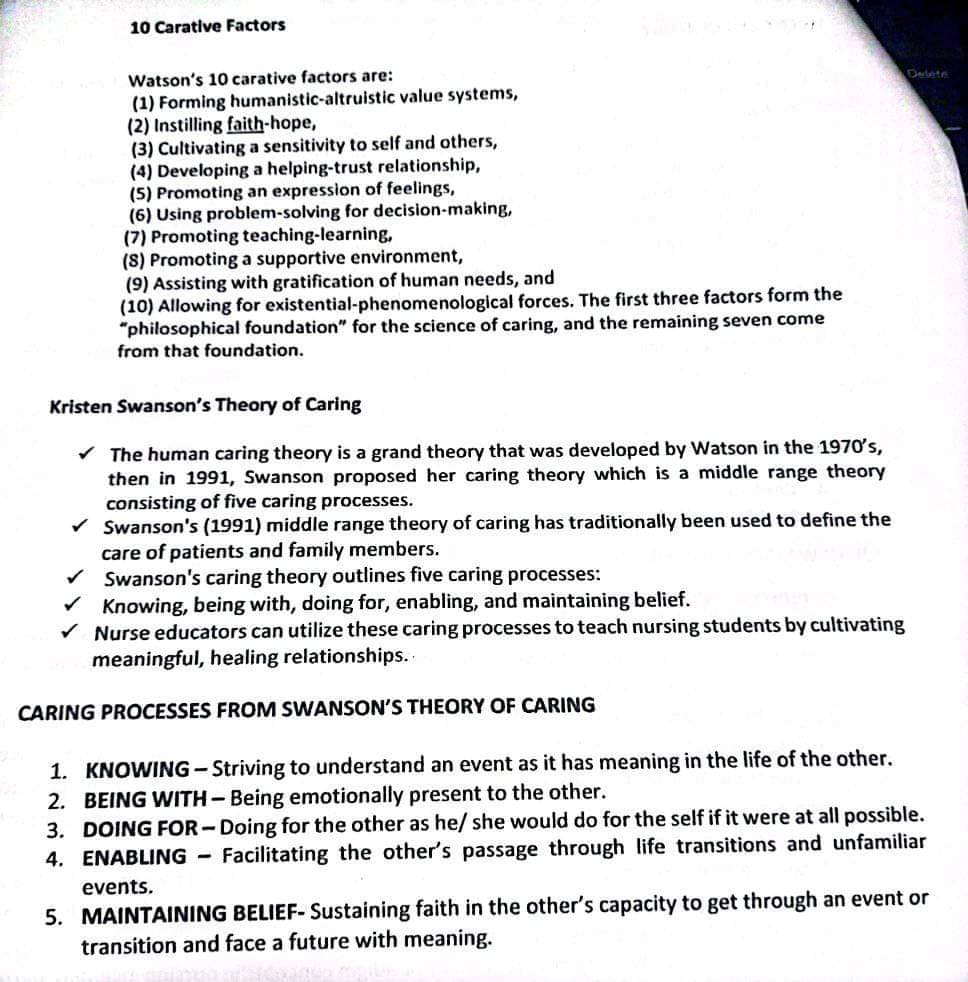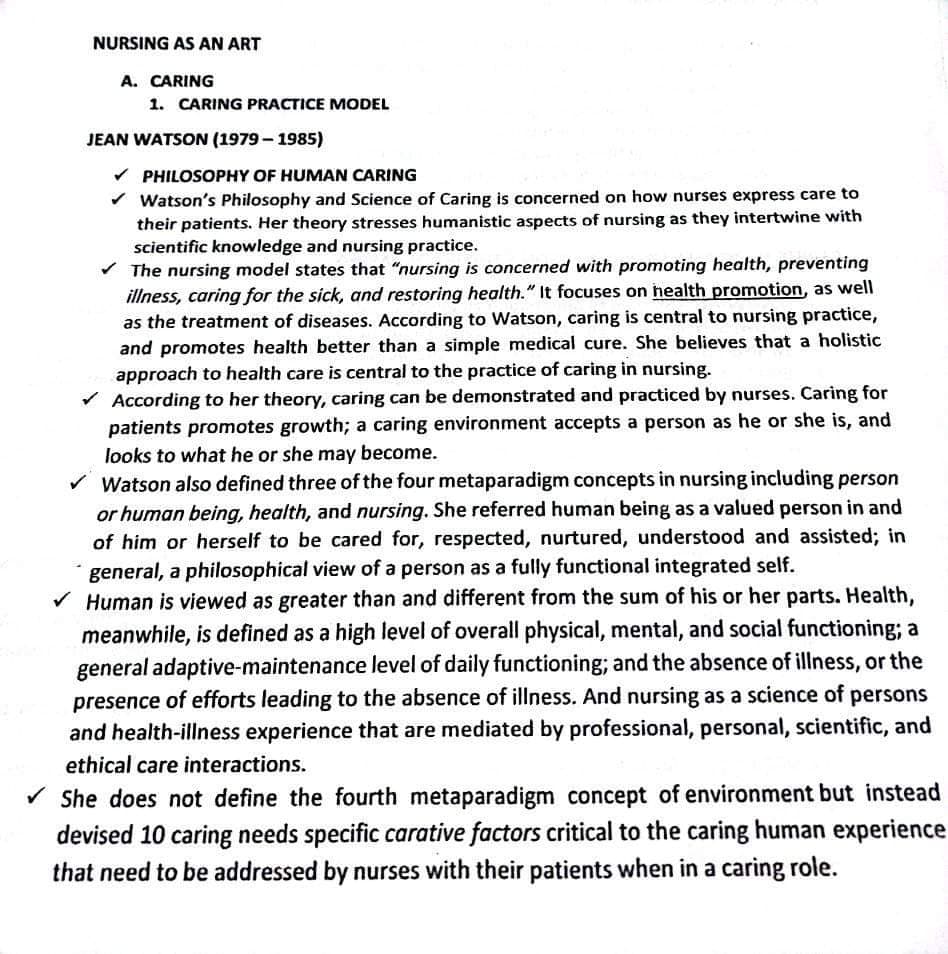lease refer to the pictures given to answer the question below: 1. Why are Jean Watson’s theory and Kristen Swanson’s theory important in the nursing practice?
lease refer to the pictures given to answer the question below: 1. Why are Jean Watson’s theory and Kristen Swanson’s theory important in the nursing practice?
Issues and Ethics in the Helping Professions (MindTap Course List)
10th Edition
ISBN:9781337406291
Author:Gerald Corey, Marianne Schneider Corey, Cindy Corey
Publisher:Gerald Corey, Marianne Schneider Corey, Cindy Corey
Chapter4: Multicultural Perspectives And Diversity Issues
Section: Chapter Questions
Problem 10SA: In small groups, explore what you consider to be the main ethical issues in counseling lesbian, gay,...
Related questions
Question
Please refer to the pictures given to answer the question below:
1. Why are Jean Watson’s theory and Kristen Swanson’s theory important in the nursing practice?

Transcribed Image Text:10 Carative Factors
Delete
Watson's 10 carative factors are:
(1) Forming humanistic-altruistic value systems,
(2) Instilling faith-hope,
(3) Cultivating a sensitivity to self and others,
(4) Developing a helping-trust relationship,
(5) Promoting an expression of feelings,
(6) Using problem-solving for decision-making,
(7) Promoting teaching-learning,
(8) Promoting a supportive environment,
(9) Assisting with gratification of human needs, and
(10) Allowing for existential-phenomenological forces. The first three factors form the
"philosophical foundation" for the science of caring, and the remaining seven come
from that foundation.
Kristen Swanson's Theory of Caring
V The human caring theory is a grand theory that was developed by Watson in the 1970's,
then in 1991, Swanson proposed her caring theory which is a middle range theory
consisting of five caring processes.
V Swanson's (1991) middle range theory of caring has traditionally been used to define the
care of patients and family members.
v Swanson's caring theory outlines five caring processes:
Knowing, being with, doing for, enabling, and maintaining belief.
V Nurse educators can utilize these caring processes to teach nursing students by cultivating
meaningful, healing relationships..
CARING PROCESSES FROM SWANSON'S THEORY OF CARING
1. KNOWING - Striving to understand an event as it has meaning in the life of the other.
2. BEING WITH- Being emotionally present to the other.
3. DOING FOR-Doing for the other as he/ she would do for the self if it were at all possible.
4. ENABLING -
Facilitating the other's passage through life transitions and unfamiliar
events.
5. MAINTAINING BELIEF- Sustaining faith in the other's capacity to get through an event or
transition and face a future with meaning.

Transcribed Image Text:NURSING AS AN ART
A. CARING
1. CARING PRACTICE MODEL
JEAN WATSON (1979 – 1985)
v PHILOSOPHY OF HUMAN CARING
v Watson's Philosophy and Science of Caring is concerned on how nurses express care to
their patients. Her theory stresses humanistic aspects of nursing as they intertwine with
scientific knowledge and nursing practice.
The nursing model states that "nursing is concerned with promoting health, preventing
illness, caring for the sick, and restoring health." It focuses on health promotion, as well
as the treatment of diseases. According to Watson, caring is central to nursing practice,
and promotes health better than a simple medical cure. She believes that a holistic
approach to health care is central to the practice of caring in nursing.
V According to her theory, caring can be demonstrated and practiced by nurses. Caring for
patients promotes growth; a caring environment accepts a person as he or she is, and
looks to what he or she may become.
Watson also defined three of the four metaparadigm concepts in nursing including person
or human being, health, and nursing. She referred human being as a valued person in and
of him or herself to be cared for, respected, nurtured, understood and assisted; in
general, a philosophical view of a person as a fully functional integrated self.
V Human is viewed as greater than and different from the sum of his or her parts. Health,
meanwhile, is defined as a high level of overall physical, mental, and social functioning; a
general adaptive-maintenance level of daily functioning; and the absence of illness, or the
presence of efforts leading to the absence of illness. And nursing as a science of persons
and health-illness experience that are mediated by professional, personal, scientific, and
ethical care interactions.
She does not define the fourth metaparadigm concept of environment but instead
devised 10 caring needs specific carative factors critical to the caring human experience
that need to be addressed by nurses with their patients when in a caring role.
Expert Solution
This question has been solved!
Explore an expertly crafted, step-by-step solution for a thorough understanding of key concepts.
This is a popular solution!
Trending now
This is a popular solution!
Step by step
Solved in 2 steps

Follow-up Questions
Read through expert solutions to related follow-up questions below.
Follow-up Question
How is the gestalt and existential theory similar in views?
Solution
Follow-up Question
What is the existential theory and how is it helpful in counseling?
Solution
Recommended textbooks for you

Issues and Ethics in the Helping Professions (Min…
Nursing
ISBN:
9781337406291
Author:
Gerald Corey, Marianne Schneider Corey, Cindy Corey
Publisher:
Cengage Learning


Comprehensive Medical Assisting: Administrative a…
Nursing
ISBN:
9781305964792
Author:
Wilburta Q. Lindh, Carol D. Tamparo, Barbara M. Dahl, Julie Morris, Cindy Correa
Publisher:
Cengage Learning

Issues and Ethics in the Helping Professions (Min…
Nursing
ISBN:
9781337406291
Author:
Gerald Corey, Marianne Schneider Corey, Cindy Corey
Publisher:
Cengage Learning


Comprehensive Medical Assisting: Administrative a…
Nursing
ISBN:
9781305964792
Author:
Wilburta Q. Lindh, Carol D. Tamparo, Barbara M. Dahl, Julie Morris, Cindy Correa
Publisher:
Cengage Learning

Case Studies In Health Information Management
Biology
ISBN:
9781337676908
Author:
SCHNERING
Publisher:
Cengage
